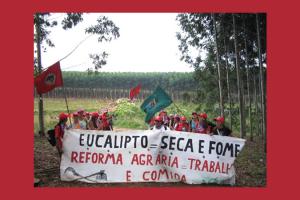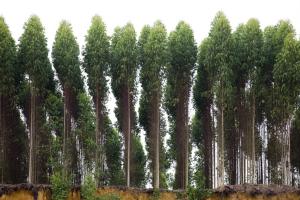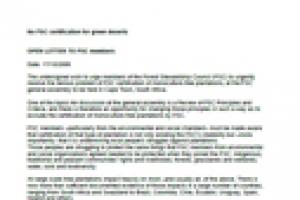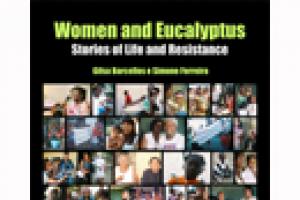On 17 June 2008, a federal court in the city of Eunápolis, in the state of Bahia, passed sentence in a public civil suit filed in 1993 by the Brazilian Federal Public Prosecutor's Office against Veracel Celulose – known at the time as Veracruz Florestal – and the government environmental agencies CRA (Centre for Environmental Resources, responsible for environmental licensing in the state of Bahia) and IBAMA (Brazilian Environmental Institute, the national environmental authority).
Brazil
Other information
24 July 2008
Other information
26 June 2008
In late May, aerial photos taken during a fly-over piloted by the coordinator of the Ethno-Environmental Front of FUNAI (the National Indigenous Foundation of Brazil) confirmed the existence of indigenous people living in voluntary isolation on the border between the Brazilian state of Acre and Peru. They are members of one of four indigenous ethnic groups living in isolation in this area.
Bulletin articles
27 May 2008
Agrofuels are increasingly drawing words of warning, protest and condemnation from such disparate voices as high-level United Nations representatives like FAO Director-General Jacques Diouf and Special Rapporteur on the Right to Food Jean Ziegler, statesmen like Fidel Castro, and social organizations in both the North and South (see notes 1 and 2). Nevertheless, plantations of crops raised specifically to produce fuel continue to spread.
Bulletin articles
28 April 2008
In Brazil there are two conflicting models: that of the large monoculture plantations (ranging from eucalyptus, soy-beans and rice to sugar-cane), on lands held by a few large companies; and that of the peasant, indigenous and landless communities that build collective and diverse productive spaces and demand the historically promised agrarian reform.
Action alerts
16 January 2008
Only available Spanish and Portuguese.
Comunicado de Prensa de RECOMA
16 de enero de 2008.
Action alerts
15 January 2008
Only available in Spanish -
15 de enero de 2008
Exmo. Sr. Luíz Inácio Lula da Silva
Presidente da República Federativa do Brasil
Exma. Sra. Marina Silva
Ministra de Meio Ambiente (MMA)
Bulletin articles
3 January 2008
In Latin America biotechnology applied to research on varieties of transgenic trees to give them certain characteristics facilitating their large-scale monoculture plantation is being led by two countries: Brazil and Chile.
In Brazil, the National Biosecurity Technical Commission (CTNBio), the body responsible for monitoring recombining DNA technology – implying gene manipulation –approved standards for planned liberation into the environment of experiments with transgenic eucalyptus trees in the country in June 2007.
Publications
22 November 2007
Impacts of Eucalyptus Monocultures on Indigenous and Afrobrazilian Women in the State of Espírito Santo.
By Gilsa Barcellos and Simone Ferreira
Women and Eucalyptus. Stories of Life and Resistance
Also available in Portuguese
Other information
8 November 2007
With the ideological discourse of big capital masquerading as sustainable development and as saviours of the poor, the pulp giants advance on the State of Rio Grande do Sul. With their capital they finance electoral campaigns, pay for misleading advertising and twist public power around their little fingers.
Other information
8 November 2007
The Government of the State of Bahia, through the Centre for Environmental Resources, (CRA) held a seminar on 7 and 8 November with the purpose of “initiating a process of discussion and reflection on the environmental, social and economic prospects of eucalyptus plantations in the South and Extreme South of the State, taking a territorial approach as a basis, centring on the construction and consolidation of public policies for the region.” This event represented the continuity of a process of discussion launched in June this year by the CRA, seeking participative and negotiated solutions
Other information
8 November 2007
In order for vast extensions of industrial plantations to be viable in Brasil direct interactions where established between the government, companies, banks, universities, media, as well as with international and financial institutions, producers and buyers. A broad political orchestration resulted in the creation of a number of mechanisms related to legal, taxation, financial, technical, scientific, agrarian and logistic support. In the same manner articulations opposing those policies increased as monocultures expanded.
Other information
17 October 2007
The invasion of local peoples’ territories by Aracruz Celulose S.A.’s agro-industrial project, established in the sixties and seventies in Espirito Santo, caused enormous material and symbolic losses to the indigenous and quilombola peoples. Some are irrecoverable.




